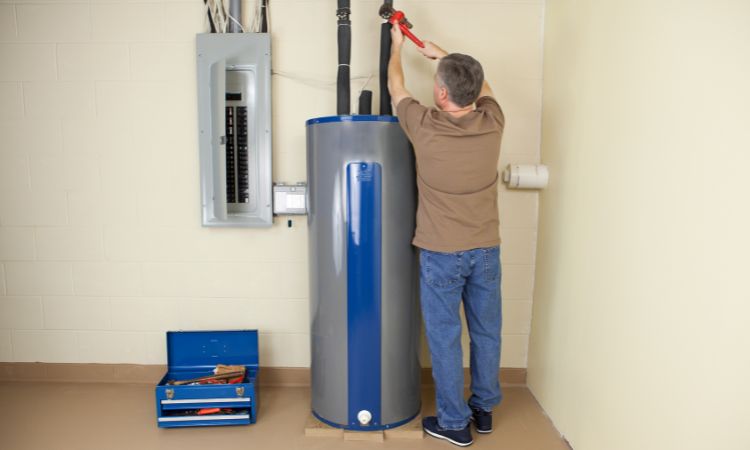Action Plan For Regular Water Heater Challenges
Action Plan For Regular Water Heater Challenges
Blog Article
Listed here in the next paragraph you can find a good deal of extremely good material relating to Common Problems with Tank Water Heaters.

Think of starting your day without your regular warm shower. That currently establishes an inadequate tone for the remainder of your day.
Every house needs a trustworthy hot water heater, however just a few know exactly how to handle one. One easy means to maintain your water heater in top form is to check for faults consistently and also fix them as quickly as they show up.
Remember to switch off your water heater prior to sniffing about for faults. These are the hot water heater faults you are more than likely to come across.
Water also hot or too chilly
Every water heater has a thermostat that determines how hot the water gets. If the water coming into your house is too warm regardless of establishing a hassle-free optimum temperature, your thermostat might be faulty.
On the other hand, also cold water might be because of a failed thermostat, a busted circuit, or improper gas circulation. For instance, if you make use of a gas water heater with a busted pilot burner, you would certainly get cold water, even if the thermostat is in perfect condition. For electrical heaters, a blown fuse may be the wrongdoer.
Insufficient warm water
Hot water heater come in several sizes, depending on your hot water demands. If you lack hot water before every person has actually had a bath, your hot water heater is as well small for your family size. You must think about installing a larger hot water heater storage tank or opting for a tankless hot water heater, which occupies less room and is extra resilient.
Odd sounds
There are at the very least 5 kinds of noises you can learn through a water heater, but the most usual analysis is that it's time for the water heater to retire.
To start with, you must know with the regular appears a water heater makes. An electric heating unit may seem different from a gas-powered one.
Popping or banging noises generally indicate there is a slab of debris in your containers, and it's time to cleanse it out. On the other hand, whistling or hissing sounds may merely be your valves letting some stress off.
Water leakages
Leakages might come from pipes, water links, valves, or in the worst-case scenario, the tank itself. In time, water will rust the storage tank, and also discover its way out. If this happens, you require to change your hot water heater asap.
However, prior to your adjustment your entire container, be sure that all pipelines are in area which each valve functions completely. If you still require help determining a leakage, call your plumber.
Rust-colored water
Rust-colored water implies among your hot water heater components is rusted. Maybe the anode pole, or the container itself. Your plumber will be able to determine which it is.
Warm water
Despite how high you set the thermostat, you won't get any hot water out of a heating unit well past its prime. A water heater's effectiveness may decrease with time.
You will also get lukewarm water if your pipelines have a cross link. This indicates that when you switch on a tap, hot water from the heater moves in along with routine, cold water. A cross connection is very easy to spot. If your hot water taps still run after shutting the water heater shutoffs, you have a cross connection.
Discoloured Water
Rust is a major source of unclean or discoloured water. Rust within the water tank or a stopping working anode rod can cause this discolouration. The anode pole protects the container from rusting on the inside and also need to be examined yearly. Without a pole or a properly operating anode pole, the hot water swiftly wears away inside the storage tank. Call a professional water heater professional to determine if replacing the anode pole will take care of the trouble; if not, replace your water heater.
Final thought
Preferably, your water heater can last ten years before you require an adjustment. However, after the 10-year mark, you may experience any of these faults much more regularly. At this point, you should add a new water heater to your budget.
How To Troubleshoot 3 Common Water Heater Problems in Twin Cities
The Water Heater Is Leaking
A leaky cold water inlet valve A loose pipe fitting A leaky temperature and pressure relief valve A corroded anode rod A cracked tank Turn Off Your Water Heater:
Shut off your gas water heater by turning the gas valve on the unit to the “OFF” position. Shut off your electric water by switching its power off at your electrical panel. Look for a two-pole breaker labeled “water heater” and turn it to the “OFF” position. Move the ball valve connected to the water heater to be perpendicular to the piping at a 90° angle. Look for the Leak:
Depending on whether the water is coming from the tank's top or bottom, you’ll want to look for the leak in different locations.
If the leak comes from the top of the tank, carefully look for water escaping from the cold water inlet valve or loose pipe fittings. Rusted hot and cold water valves can have loose connections with the tank, with water leaking out of them.
https://mspplumbingheatingair.com/blog/how-to-troubleshoot-3-common-water-heater-problems
Do you like reading up on Water Heater Repair and Troubleshooting? Try leaving feedback directly below. We'd be delighted to see your insights about this blog. In hopes that you come back again in the near future. Sharing is caring. Helping people is fun. Thanks a lot for your time spent reading it.
Visit My Web Page Report this page